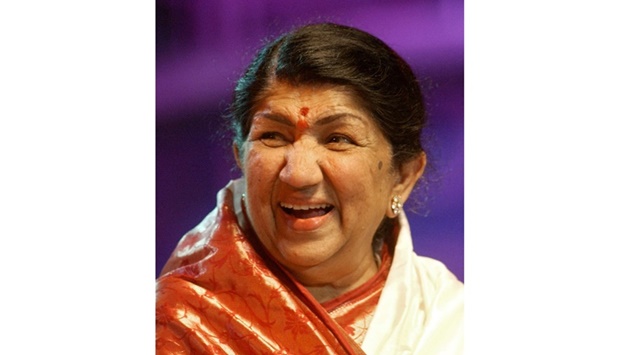Lata Mangeshkar, one of India's biggest cultural icons and a singer who defined music and melody for generations of her countrymen, died on Sunday.
She was 92 and is survived by her four siblings. She was hospitalised on Jan. 11 after being infected with what a doctor told Reuters was Covid-19.
Mangeshkar died on Sunday morning of "multi-organ failure after more than 28 days of hospitalisation post Covid-19," said Dr Pratit Samdani, who was treating her at Mumbai's Breach Candy Hospital, according to Reuters TV partner ANI.
Mangeshkar's voice has rung out of television sets, on crackly airwaves and from movie theatres for most of independent India's three quarters of a century, making hers the defining voice of many generations and earning her the title of "the Nightingale".
"I am anguished beyond words," Prime Minister Narendra Modi wrote on Twitter.
She will receive a state funeral, and the government will observe state mourning with the flag at half-mast through Monday, the Home Ministry said in a statement.
"The kind and caring Lata Didi has left us," the prime minister wrote, using an affectionate term for older sister.
"She leaves a void in our nation that cannot be filled. The coming generations will remember her as a stalwart of Indian culture, whose melodious voice had an unparalleled ability to mesmerise people."
Born in 1929 in pre-independence India, Mangeshkar began singing in her teens, and in a career spanning 73 years sang more than an estimated 15,000 songs in 36 languages.
She enthralled music-mad Indians with her lilting voice and sheer range, singing everything from patriotic songs to romantic numbers, both in films and albums.
The world of Bollywood - where movies were unthinkable without at least six songs and where everything from romance to grief was narrated with the help of a ballad - was where Mangeshkar cut her teeth and later made her name.
Other Bollywood personalities and politicians offered condolences.
"Love, respect and prayers," tweeted Oscar- and Grammy-winning Indian musician A R Rahman. Mangeshkar sang a number of his award-winning songs.
Classically trained, Mangeshkar moulded her voice to the demands of singing for Bollywood movies, even voicing songs in her 60s for an actress who was in her 20s.
Her songs motivated millions of Indians during wars with China and Pakistan to pay homage to the defence forces. Some of her songs are used as prayers in temples, shrines and schools.
"My voice is a gift from God," she once told an interviewer. "I learned to emote through my voice. When I sang a lullaby, I became a mother, when it was a romantic song, I was a lover."
The only songs she refused to sing were cabaret numbers and songs that had bawdy or racy lyrics, saying in later interviews those did not fit with her personal values. Mangeshkar nevertheless dominated the Hindi film industry for almost five decades until the 2000s, along with her younger sister Asha Bhosle.
Mangeshkar's detractors accused her of using her Bollywood clout to limit the entry of newcomers. Her influence was such that Mumbai authorities in 2006 scrapped a planned highway flyover after she objected that it would disturb her privacy.
Known for soft-spokenness and wearing a saree, her hair in two schoolgirl-like braids, Mangeshkar received India’s highest civilian honour, the Bharat Ratna, in 2001. She was awarded France's highest civilian honour, the Legion of Honour, in 2009.
"Music is incomplete without your voice," actor Amitabh Bachchan said of Mangeshkar in 2019, commemorating her 90th birthday. "It has done the work of saints,”

